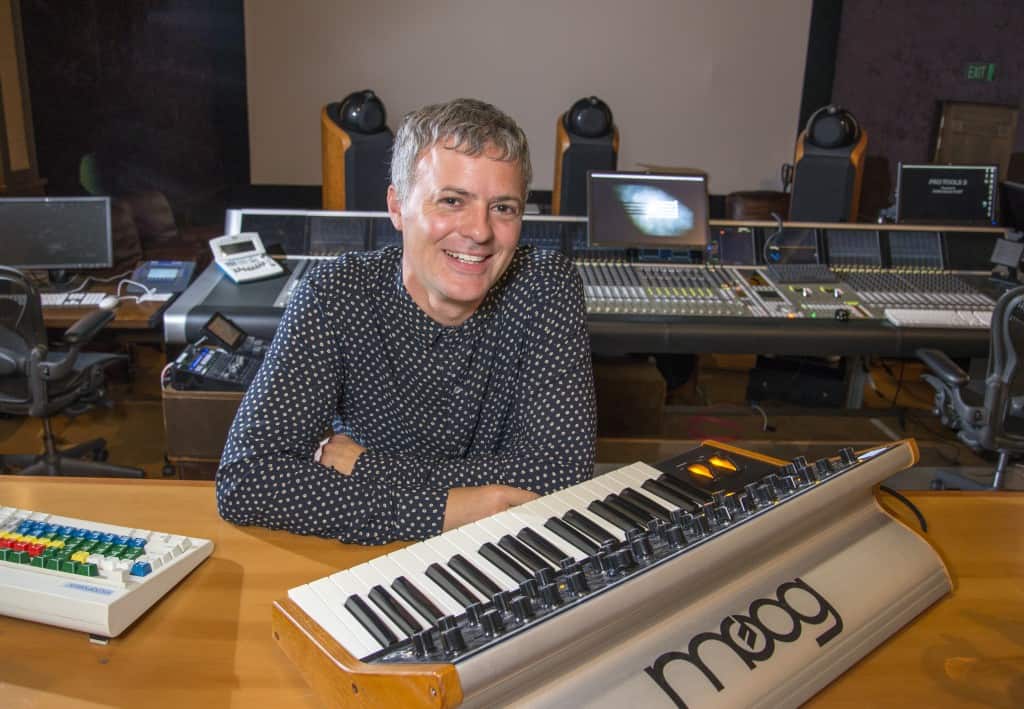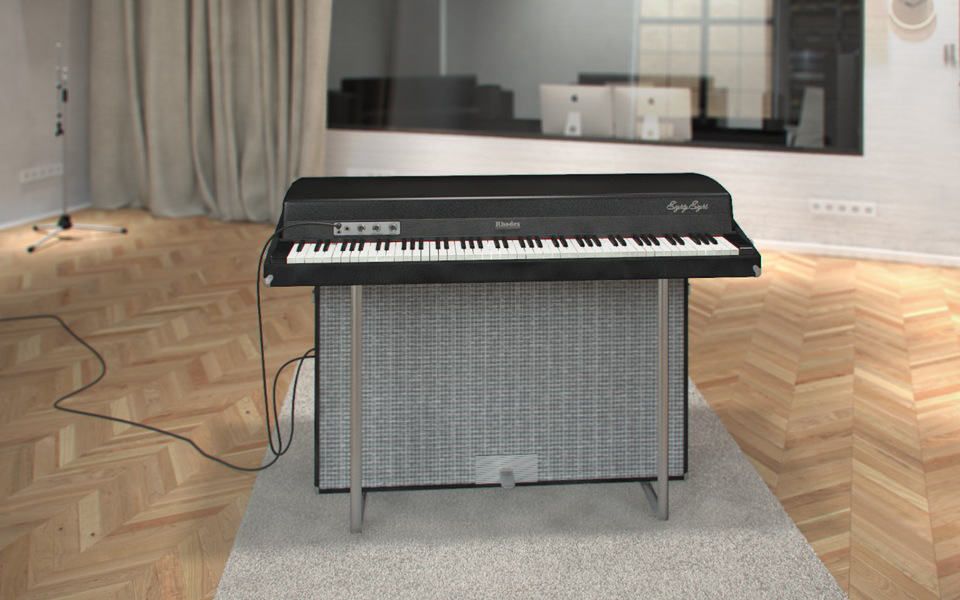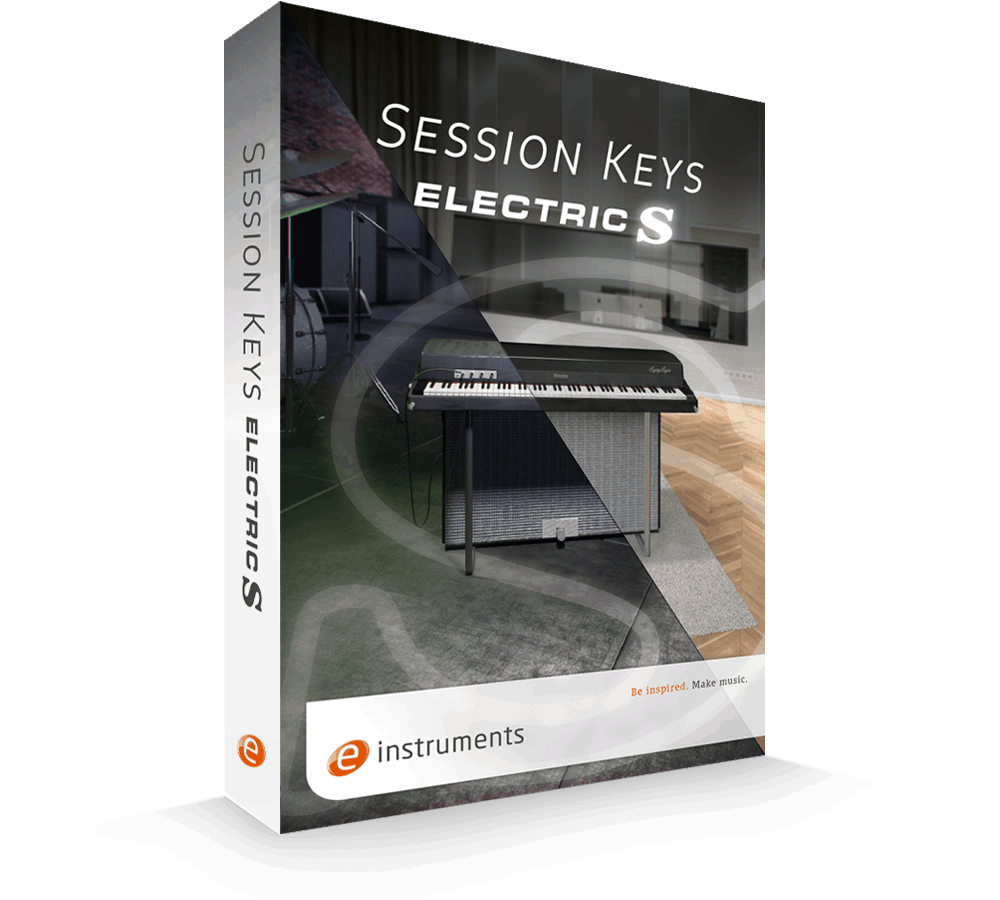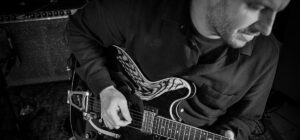Stephen Gallagher Talks about Session Keys Electric S
“As someone who’s owned three Rhodes and played a lot of Rhodes pianos I have been skeptical of Electric Piano samples in the past, and I’ve tried a lot of Rhodes emulators and samples and software. Session Keys Electric S is the best hands-down that I’ve ever used and I can’t imagine ever being without it. It’s something I will use every day, no exaggeration. I love it.”
You heard it from him first – words of praise from Rhodes aficionado Stephen Gallagher for the Session Keys Electric S, our Suitcase piano instrument. Gallagher is an award-winning composer and music editor, working from his native New Zealand on projects as varied as Hollywood blockbusters, independent documentaries and online web series, with household names including Peter Jackson, Brian Eno, Ed Sheeran and Nick Cave.
He is a passionate devotee of the Rhodes, and hugely excited by e-instruments’ authentic emulation of its sound. He talks to us about his love of the instrument and how he’s adapted to life after five years working on the epic Hobbit trilogy.
Life after Middle Earth
Amongst his inspiring resume Gallagher’s work composing and producing for Peter Jackson’s Hobbit blockbusters stand out as an all-consuming project that must have had a big impact on him. He admits it’s taken time to adjust to life post-Hobbit, describing a huge sense of achievement, but also loss – letting go of something that you’ve almost physically inhabited for years. “Firstly for me it’s the people.
On The Hobbit we were working with a great team of people in the music department over four or five years. You form relationships and get to know people pretty well, and then at the end of that time everyone goes their separate ways.
I miss the people; I miss spending time, hanging out and working alongside these amazing people that I was lucky enough to work with. Secondly, you feel part of a world. You’re living in this world and operating within the tenets of this world – Middle Earth.
You’re creating Middle Earth and creating music for it and thinking about all the idiosyncrasies that go into it, and at the end it really feels like you’ve stepped away from a place you’ve been living in for five years, and the chance of ever returning to that place is slim indeed. There is a grieving process – not many people talk about that”.
Amidst the loss must come uncertainty as to what projects to turn to next – but the cheerfully optimistic Gallagher viewed it more as a new chapter opening with different realms of possibility and a change of scene.
“Waking up in the morning and knowing that The Hobbit isn’t there waiting for you can be scary, but at the same time there were a couple of things it was nice to go and do. Going and working on an installation for a little while, working on a theatre piece, doing a couple of documentary scores and some TV work, and a couple of other films.
It was good to be in a different ecosystem for a while, a different environment, different people, different workflow. I guess not as intense – though also mostly not as well resourced. I feel a lot of gratitude for being part of The Hobbit, it was amazing, and the skill-set I picked up there is certainly carried through to other projects.
It’s been a really exciting last twelve months because there’s an initial grieving process but then other possibilities or opportunities appear, and taking them up and exploring them has been really rewarding. And sometimes a bit scary – as any freelancer would probably tell you, not knowing where your next job is coming from can be kind of scary at times.”
Not that the in-demand composer and editor seems to have any trouble attracting work.
“Right now I’ve just stepped off the dub stage from a film called League of Gods which we’re mixing here at Park Road Post [Production studios in Wellington, New Zealand]. John Debney’s done the score, I’m working as the music editor. We’ve been working on this film, on the final dub for about four weeks, it’s sounding fantastic, a great sounding film.
Other than that I’ve been working on a couple of scores, and an installation piece, and a couple of TV documentaries, and a feature film called Bilal; I was the music editor and also did some extra music for it. The rest of it’s a bit of a blur actually!”
The piano man

Across his varied projects Gallagher is a keyboard and piano man through-and-through, having fallen for the Rhodes sound early in his career and remaining a passionate advocate.
“I’ve got a lot of friends whose first port of call is their beaten and well-loved acoustic guitars, but for me it’s always been keyboards, specifically synthesizers. Oddly enough I didn’t really touch a piano until I was half-way through my teens. Then we inherited a piano and that was a real ‘wow’ moment; when I discovered this incredible instrument very different from a synthesizer.
And I remember when I first played a Rhodes piano. I was in a studio with a band I was playing with, and an engineer had a Mark I; I’d never played anything quite like it and I loved it. We plugged it into the board and used it on every track we were recording – myself and the rest of the band fell in love with the sound.
So that set me off on trying to find one of my own which I managed to do. I’ve owned three and toured around the country with them – and treated them pretty roughly! I’ve owned two suitcase Rhodes and one stage Rhodes, and also a Nord Stage as well, when I was wanting something a little lighter to carry.”
Even as a tough-to-impress Rhodes purist he was blown away by his first experience of the Session Keys Electric S.
“From the minute I opened it up and just heard a low D, I was just like ‘yeah, this is amazing!’ I think the great thing about that piece of software is that it combines my love of tinkering with synthesizers and changing sounds, and a love of real instrument; it combines so many important things. It’s a really exciting piece of software.”
He is particularly enthused by the morphing function, letting him replicate the Rhodes unplugged sound which he is clearly deeply fond of: “I love that you can pull the sound down to make the Rhodes sound like they do when you turn them off and don’t plug them into an amplifier. I love that, it’s a really intimate sound and a great basis for sound design.
I didn’t realize how much I missed it until I heard it – when I put the software up in my session I was like ‘oh I remember this!’ It’s such a lovely sound, such an intimate thing just sitting down and playing unplugged. I just remember the times I was in the practice room or in a studio somewhere and there was nobody else around and I didn’t have the Rhodes plugged in… just playing that sound.”
A physically pleasurable experience

There’s a distinct feel to the Rhodes, Gallagher believes, that captures musicians’ imaginations and has made it such a loved instrument:
“When you sit down in front of a Rhodes and you’re playing it it’s a very pleasurable experience, it just feels great. When you compare it, say with the first time you sit down and play a Hammond B3… I don’t find that a physically pleasing thing to do, I find it very unwieldy.
Whereas the Rhodes… it’s something about the bell-like tones, overtones, and the response, the way the keyboard responds when you push it hard or push it softly. It’s just a really beautiful sound (or when like me you run it through a lot of distortion fields it can be an ugly sound!) But it’s a rich sound.
I see the four tenets of the keyboard world being the grand piano, the Hammond B3, the Rhodes, and the Moog. Any one of those instruments you can pretty much add to any track and it’ll sit in the texture, it suits.
Their sounds are so classic and they’re so malleable in terms of being able to add it to any ensemble or any arrangement, and so compelling. Especially the Rhodes, it’s such a great texture to add into a song.”
And the tools and versatility of the Session Keys Electric S are faithful to the malleability of the original classic? “The exciting thing is it feels like an extension of the instrument. It doesn’t feel like it’s a whole load of things superimposed on a Rhodes, it sort of seems like an extension of the instrument itself.
I think the morphing idea is brilliant, and the Unique setting, that’s amazing, that just sounds incredible, it seems to leap out of the speakers. I love the fact that you can change the position of the tines, it’s amazing.
And the way you can assign reverb to the Pentamorph and integrate the other effects, it’s a really intuitively-designed piece of software. Going back to that unplugged sound, then messing with the noises, and the additional reverb assigned to the morph page. It’s just amazing, you can get great sounds really quickly.
Whatever you’ve modeled the phaser and the amp on they sound incredible. The quality of those effects in that program feel like the excitement and the grit of running your Rhodes through stomp boxes; the edges aren’t polished off, it has some roughness and some grit and I really like that.”
The best Rhodes emulation you can get
From this personal experience Gallagher believes just about every music professional ought to embrace the Session Keys Electric S:
“If you’re writing music for media I’d say you’d want this in your tool kit; its malleable, it’s exciting, you can get great sounds really quickly. It’s the best Rhodes emulation you can get really.
At one end you’ve got a fantastic Rhodes emulation, with a great series of effects that mimic stomp boxes and things like that. At the other end you’ve got this incredible array of sound design and sound manipulation tools that you can used to shape, sculpt, destroy – just to make some stunning sounds very quickly and very intuitively. If you’re writing for games, music, film, TV – you need this.
Secondly I’d say if you’re a keyboard player in a band and you’re sick of lugging your suitcase Rhodes up and down six flights of stairs to get to your gig or your practice room then boy have I got the solution for you! This program! I’d take this program out live. I would have no qualms in taking it on my laptop, plugging it into my controller keyboard and using the sound as my Rhodes on stage. It sounds amazing.
For producers as well, this is going to be a very useful instrument, because you’ve got a great Rhodes sound but you’ve also got the Animator, the chords feature: you have an instrument that going to sound great right away straight out of the box.
This the best emulator hands-down that I’ve ever used and I can’t imagine ever being without it. It’s something I will use every day, no exaggeration. I love it.”
He may have spent a long time in Middle Earth but it seems that for Gallagher Session Keys Electric S is out of this world.

Crafting The Sound: The Journey Behind Desolate Guitars – Part 2 Lars Dahlke
Dive into the second chapter of our blog series as we catch up with Lars Dahlke, e-instruments’ Product Designer and accomplished guitarist. Seton Daunt’s vision for a realistic guitar instrument…
Crafting The Sound: The Journey Behind Desolate Guitars – Part 1 Seton Daunt
Recognizing a void in the realm of realistic guitar instruments, Seton Daunt envisioned a sampler instrument that encapsulated a very realistic representation of a specific style of guitar tone that…

